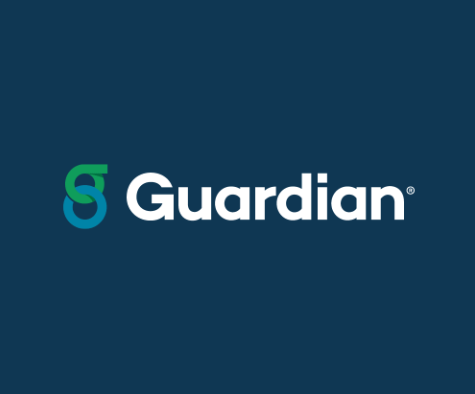Guardian was founded in 1860 as Germania Life Insurance, a small outfit designed to meet the needs of German immigrants in the U.S. Within two years, it grew to a large, nationwide firm.
Today, Guardian Life is headquartered in Manhattan. Its 7,000 employees provide services to 29 million customers.
- CEO: Andrew J. McMahon (October 2020 – )
- Year founded: 1860
- BBB score: A+
- A.M. Best rating: A++
- Phone number: 1 (212) 598-8000
- Services offered: Life insurance, disability insurance, dental insurance, vision insurance, accident insurance, cancer insurance, critical illness insurance, hospital indemnity insurance, annuities, investments, and financial business solutions.
Guardian Disability Insurance: Fast Facts
Guardian offers group coverage options for employers and more comprehensive options for private, long-term plans.
- Disability insurance products: Individual long-term disability (LTD), Group short-term disability (STD)
- Eligibility requirements: 15 percent loss of income due to qualifying disability
- Benefit periods: two (2) years, five (5) years, 10 years, age 65, age 67, or age 70
- Maximum benefits: $30,000 per month
- Elimination periods: 30 days, 60 days, 90 days, 180 days, 365 days, or 730 days – or seven (7) to 14 days for most short-term disability plans
- Discounts: 30 to 36 percent discounts for employer group plans. 10 percent discount common for physician LTD plans.
Guardian Disability Insurance: Definition of Disability
Although many insurance companies use an any-occupation definition of disability, Guardian’s definition has a broader, more generous scope that offers better protection.
True Own-Occupation
This definition is also referred to as total disability while working. It means that you are eligible to collect disability benefits if your condition prevents you from doing any part of your job. This is the simplest possible definition with the easiest criteria to meet.
If you are no longer able to work as an ER physician, but still able to perform work in another medical field of occupation, you would still meet the definition of disability and be able to collect benefits.
Learn More:
Guardian Disability Insurance: Built-in Benefits
Guardian’s disability insurance comes with a number of built-in benefits. These are included in your plan and do not increase the cost of your premiums like riders.
- Automatic benefit enhancement: This option means your benefits will increase automatically annually for the first years you hold your policy.
- Unemployment waiver of premium: Guardian Provider Choice policyholders will waive your monthly premiums if you are temporarily furloughed or unemployed.
- Social insurance substitute: If you are able to collect other employment assistance — such as worker’s compensation or Social Security disability insurance — you can reduce your coverage and commensurate premium with Guardian by the amount of outside assistance you receive.
Riders
Guardian offers optional policy add-ons, called riders, that can enhance your coverage. These riders will increase your premium costs, but many physicians find the added protection well worth it.
1. Cost-of-Living Adjustment (COLA)
The COLA rider is designed to increase your benefits to keep pace with inflation.
The policy for Guardian Provider Choice offers three different COLA riders:
- Annual 3 percent increase
- Annual increases up to 6 percent maximum, based on the Consumer Price Index
- Annual 3 percent increase begins after the fourth anniversary of your disability
Additional payouts — after the termination of disability benefits — may also be dispersed.
2. Future Increase Option (FIO)
The Future Increase Option rider is considered a must by financial planning experts. This rider enables you to increase your insurance coverage as your career earnings increase.
3. Catastrophic Disability
The Catastrophic disability insurance rider means that if you become catastrophically disabled, you can receive an additional monthly benefit on top of any existing coverage. A catastrophic disability means you are unable to feed, bathe, dress, use the toilet, or perform other basic care functions.
This rider provides extra funds — up to 100 percent in income replacement — if you are “functionally impaired or irrevocably” disabled. It also grants a compound 3 percent cost-of-living adjustment.
4. Student Loan Repayment
An especially important benefit for younger physicians who are still paying for medical student loans.
The Student Loan Repayment rider will pay an additional $2,000 per month in addition to standard disability benefits. The additional payment is specifically designated for student loan debts; if your student loans are paid off there is no additional benefit.
5. Residual Disability
Guardian offers basic and enhanced residual disability coverage. Residual coverage provides for the long-term impacts of an illness or injury after initial treatment or rehabilitation, including residual physical, cognitive, or emotional impairment.
Basic residual coverage kicks in for lost wages of at least 20 percent and the inability to work full-time or provide some of your job’s material duties. For enhanced coverage, you would need lost wages of at least 15 percent.
With either option, a loss of greater than 75 percent of your income would be considered a total disability and you’d be able to receive 100 percent of your monthly benefits.
6. Retirement Protection Plus
This rider provides an added benefit for retirement savings. If you become disabled, the rider pays out additional funds for you to continue saving for your retirement. These benefits may be equal to your own, and any other employer-match contributions, that were lost due to your disability.
7. Lump Sum Disability Benefit
An exclusive Guardian offer, this rider provides a “bonus” at age 60, equal to 35 percent of all total or partial benefits paid until that age to make up for any lost savings earlier in your career due to a period of disability.
Premiums
Most premiums range from 1 to 5 percent of your annual salary, or $1,000 to $5,000 of every $100,000 in salary earnings.
Level of coverage, age, sex, specific field of practice, salary, general health, geographic location, and other factors will determine cost. Your sex, followed by age, are the two demographic factors that usually bear the most impact.
There is a quote estimator tool on the Guardian website, however, it’s completely useless. I’ve tested the tool at length and found it to be wildly inaccurate. No matter what inputs I provided for age, state of residency, sex, elimination period, or medical specialty, I was continually given the same $196 rate.
Alternatives
Principal
One of the “Big 5” carriers, Principal is known for its excellent customer service and outstanding underwriting.
The provider has three definitions of disability including any occupation; own occupation, not working; or true-own occupation.
Elimination periods range from 60 to 365 days, and policies are renewable and non-cancellable.
Principal is more expensive than other providers but does offer an exceptional range of benefits, optional riders, and additional coverage options.
Additionally, Principal offers outstanding transparency in providing quotes (directional) for different individuals based on a range of unique data inputs like age, sex, and specific field of practice.
MassMutual
Founded in 1851, MassMutual is one of the nation’s oldest disability insurance providers and one the Big Five providers of specialty disability insurance for physicians.
MassMutual offers healthcare providers two disability plan options, Radius and Radius Choice. You can customize either plan with riders and personalize features to meet your needs.
Some find that their definition of own-occupation disability is narrower than other carriers, but it does offer a number of competitive benefits like an extremely generous COLA rider.
Ameritas
Founded in 1887 in Lincoln, Nebraska, Ameritas is a large and trusted name in the industry and one of the Big Five companies that has a true own-occupation definition for disability.
Ameritas offers more flexibility and coverage for physicians than most other carriers through its two plan options, DInamic Foundation and DInamic Fundamental.
The Fundamental policy is especially popular because of its affordability and unique set-up. Your total benefit is paid out in one lump sum rather than monthly over your benefits period.
The Standard
Another Big Five disability insurance provider, The Standard is one of the largest and most reputable true own-occupation insurance carriers.
Their Platinum Advantage plan is specifically designed for medical professionals and offers excellent coverage for physicians, dentists, and other industry professionals. You would need to purchase an Own Occupation rider to make it a true own-occupation policy though.
The Standard is known for offering the best coverage for older applicants over age 60 and more comprehensive residual disability benefits.
Pros and Cons
Here are a few of the pros and cons of disability insurance coverage with Guardian:
Pros
- Excellent financial strength rating. It holds an A++ rating (highest) by AM Best.
- A comprehensive definition of disability. Guardian uses the true own-occupation definition, which is the easiest standard to meet. Here, you are eligible for benefits if unable to perform any part of your current job.
- Student loan protection options. Receive up to $2,000 a month for student loan debts.
- Guaranteed renewability. Up until age 70 (or whatever earlier age you designate in policy options), your plan is guaranteed renewable and non-cancellable.
Cons
- Stricter underwriting. Plans are underwritten by Berkshire Life, known for being slow and rigorous. Applicants with pre-existing conditions may not be approved – even with exclusion clauses.
- More expensive than other disability insurance carriers. Guardian’s premiums can be 5 percent or higher of your annual income.
- Long elimination periods. Wait periods can be up to 730 days long.
Frequently Asked Questions
Is Guardian a Good Disability Insurance?
Responses should be concise and mirror competitors’ responses.
Yes. While the underwriting has been described as “tough” Guardian provides excellent disability insurance coverage with many specially designed options for physicians and healthcare professionals. The company enjoys an A+ rating on the Better Business Bureau (BBB).
Disability premiums typically range from 1 to 5 percent of your total income, but to get the best coverage you could shell out a bit more.
Beyond disability insurance, Guardian offers many other products to meet your family’s long-term health and financial needs, like dental insurance, vision insurance, retirement planning, and wealth management.
Is it a Good Idea to Get Disability Insurance?
Yes, disability insurance provides financial stability in the event that an illness or injury prevents you from being able to work.
Most overlook disability insurance because they don’t understand what “disability” means. They may associate the term with a permanent mental or physical deficiency when in fact one-third of working Americans will become “disabled” – unable to work due to sickness or injury – for at least one prolonged episode before reaching age 67.
Disability insurance can provide financial continuity so the bills get paid and you don’t lose your home. You can focus on recovery, not mounting debts.
Is Guardian Disability Insurance Taxable?
It depends. For short-term disability (STD) insurance, benefits may be taxable if your employer paid for the policy or you made pre-tax contributions to the policy. But if you paid for some or all of the STD premiums with after-tax dollars, then that portion of your benefits would not be subject to federal taxes.
Guardian long-term disability (LTD) is generally not taxable, because LTD is generally an individual plan paid for with post-tax dollars.
What is the Difference Between Disability and Disability Insurance?
People often say “disability” to refer to Social Security disability insurance (SSDI) benefits and “disability insurance” to refer to private (non-government sponsored) disability insurance plans such as Guardian disability insurance.
“Disability” through Social Security does provide coverage in the event of disability, but under much tighter circumstances. To qualify, you must have generated a minimum amount of taxable income and be totally disabled, meeting the definition of any-occupation disability. Benefits are meant to provide long-term relief (generally until you reach retirement age) but may be capped based on your projected lifetime earnings.
For “disability insurance” or private coverage offered like Guardian’s, it’s easier to receive financial benefits. To qualify, you must purchase a policy, pay the premiums, and meet the (less stringent) definition of disability outlined in the plan you select.
Bottom Line
Guardian is a top disability insurance provider for physicians and their employers. Its true-own occupation definition of disability makes it an attractive, highly competitive plan.
Far from the cheapest provider, Guardian is known for having higher costs (premiums), stricter underwriting, longer elimination periods, and limited options for older policyholders.
But overall, Guardian offers excellent disability insurance options. For physicians and other high-net-worth individuals, Guardian Insurance deserves a spot on your list of top contenders.
The provider offers policies that you can personalize to meet your individual needs with optional riders, including options for student loan benefits, retirement protection, lump sum disability benefits, and especially generous cost-of-living adjustments.




